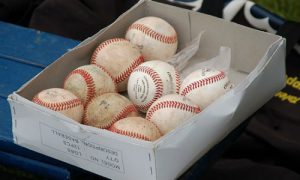Baseball is on week away from one of its most exciting events: the non-waiver trade deadline.
This year, teams like the Detroit Tigers, Cincinnati Reds and Chicago Cubs are rumored to be the most proactive franchises leading up to July 31.
But before we dive into all the speculation, here’s a brief explainer on what the trade deadline actually means.
July 31 marks the last day that franchises can trade players without having to go through a complicated process.
MLB Trade Rumors has a good explainer on what that means, but I’ll lay out the basics for you.
• If a team wants to trade a player after July 31, they must place him on waivers. If another franchise claims that player, the original team has 48.5 hours to negotiate a trade or else the claiming team takes on that player’s salary without having to hand over anything.
• However, the team that placed the player on waivers can also recall their claimed player within the two-day timeframe without consequence.
• If a player is placed on waivers and goes unclaimed for 47 hours, then the trading team is free to deal that player to any franchise in MLB. This is usually what happens, as most teams do not want to interfere with the businesses of other franchises.
• Teams often put their whole team on waivers just to see if there’s interest from other franchises. Since they can recall any claimed player, there are little consequences for doing this, and most of these transactions are not made public.
OK, you’re probably a little dizzy from all of that baseball legalese. I am too.
But this is exactly why the July 31 deadline gets so hot. Most franchises don’t want to deal with the headache of waivers if they’re actually trying to move or acquire assets.
The big trend in baseball right now is teams “renting” players for a short period of time to help them go the distance in the playoffs.
Last year, for instance, the Boston Red Sox traded pitcher Jon Lester to the Oakland Athletics for left fielder Yoenis Cespedes. At the time, the A’s were eyeing a World Series run and thought Lester would give them an edge.
But, more importantly, bringing Lester to Oakland had almost zero financial consequences for the A’s. His contract was due to expire at the end of 2014, and the team was under no obligation to give him a new one thanks to free agency.
Lester was just one example of a player getting “rented” after July 31 last season.
The Red Sox were barely recognizable after their midsummer fire sale. And, they’ve had a difficult time this year.
But thanks to all of those trades, Boston strengthened its minor league farm system (currently ranked No. 1 by ESPN’s Keith Law), setting them up for future success.
Teams like the Reds and Tigers might be trying to pull off a similar stunt this season.
Both franchises are unlikely to pull themselves out of purgatory in their respective divisions (with records at or below .500), so selling their top assets to strengthen their futures might be the smart move to make.
The Cubs, who also boast one of MLB’s strongest farm systems, are particularly interested in Tigers pitcher David Price.
Price will be a free agent next season, so there’s little long-term financial commitments that come with acquiring him, and Detroit would likely receive some prized prospects in return.
The Reds could also strengthen their farm system by dealing pitchers Johnny Cueto and Aroldis Chapman, both top trade targets according to ESPN. The Tigers, meanwhile, are aching for bullpen and starting pitching help. If Price is dealt, the Tigers could be buyers for a new pitcher.
ESPN considers Philadelphia Phillies pitcher Cole Hamels the No. 1 trade target this year, but Hamels comes with a $67.5 million price tag over the next three years.
For story ideas, watch the rumors surrounding your local team, whether it’s MLB or AAA. Sometimes, prospects enter into some of these big deals. And, the players placed on waivers by your team could easily be gone next season, even if no one claims them.











